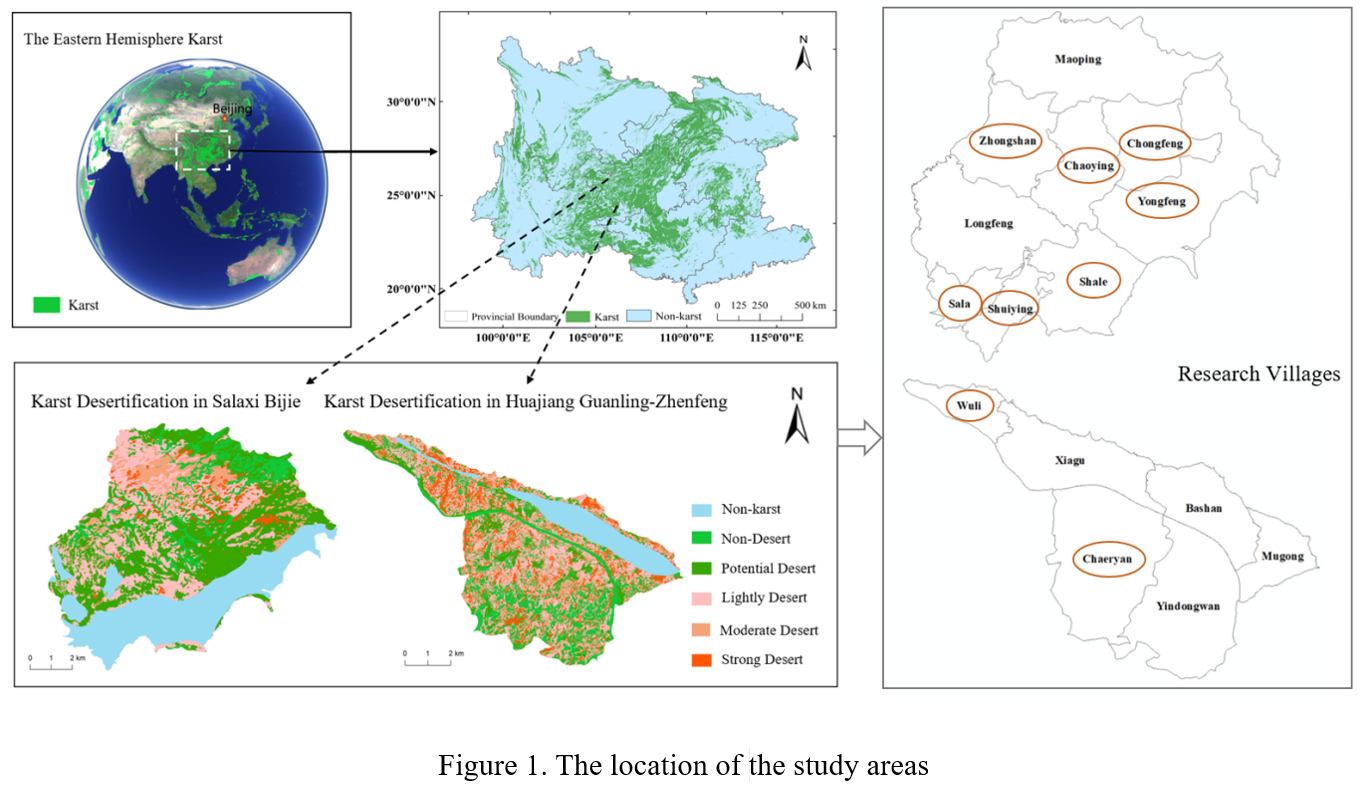Vulnerability and Impact Mechanisms of Social-Ecological Systems in Karst Desertification Control: An Analysis Based on Farm Household Survey Data
Abstract
Vulnerability and its assessment framework provide a new perspective for the study of social-ecological systems in Karst regions. Drawing on theories related to social-ecological systems and vulnerability, this paper explores the measurement and interpretation of human-land relationships in Karst mountainous areas under the context of rocky desertification governance. From the perspective of sensitivity and adaptive capacity, an evaluation index system is constructed. Through participatory household surveys and field research, the vulnerability of local social-ecological systems based on households is measured, and the vulnerability of different types of households and regions is analyzed. Taking regional sensitivity and household adaptability as entry points, practical countermeasures and suggestions are proposed to provide a basis for decision-making by relevant departments. The study shows that: (1) There is a severe lack of natural capital, and the social and financial capital of pure agricultural and agriculture-dominant households urgently need improvement. (2) The lack of natural capital and the differentiation of adaptive capacity are key factors affecting vulnerability. The construction of cognitive and social capital can enhance system adaptability and reduce system vulnerability. (3) The lack of natural capital and the differentiation of adaptive capacity increase system vulnerability, while household cognition and social capital construction help improve the system's ability to cope with risks, mitigating or reducing system vulnerability.
References
Chang, H., Pallathadka, A., Sauer, J., Grimm, N. B., Zimmerman, R., Cheng, C., ... Herreros-Cantis, P. (2021). Assessment of urban flood vulnerability using the social-ecological-technological systems framework in six U.S. cities. Sustainable Cities and Society, 68, 102786. https://doi.org/10.1016/j.scs.2021.102786
Chen, J., Yang, X. J., Wang, Z. Q., & Zhang, L. X. (2015). Vulnerability and influence mechanisms of rural tourism socio-ecological systems: A household survey in China's Qinling mountain area. Tourism Tribune, 30(3), 64–75.
Fang, J. Z., Xiong, K. N., Chi, Y. K., Song, S. Z., He, C., & He, S. Y. (2022). Research advancement in grassland ecosystem vulnerability and ecological resilience and its inspiration for improving grassland ecosystem services in the Karst Desertification Control. Plants-Basel, 11(10), 1290. https://doi.org/10.3390/plants11101290
Groot, J. C. J., Cortez-Arriola, J., Rossing, W. A. H., Améndola Massiotti, R. D., & Tittonell, P. (2016). Capturing agroecosystem vulnerability and resilience. Sustainability, 8(11), 1206. https://doi.org/10.3390/su8111206
Gunderson, L., & Holling, C. (2003). Panarchy: Understanding transformations in human and natural systems. Island Press.
Guo, X. L., Zhou, L. H., Chen, Y., Yang, G. J., Zhao, M. M., & Wang, R. (2017). Impact of farmers' livelihood capital on livelihood strategy in a typical desertification area in the Inner Mongolia Autonomous Region. Acta Ecologica Sinica, 37(20), 6963–6972.
Holling, C. S. (1973). Resilience and stability of ecological systems. Annual Review of Ecology and Systematics, 4, 1–23.
Janssens de Bisthoven, L., Vanhove, M. P. M., Rochette, A. J., Hugé, J., Verbesselt, S., Machunda, R., ... Brendonck, L. (2020). Social-ecological assessment of Lake Manyara basin, Tanzania: A mixed-method approach. Journal of Environmental Management, 267, 110594. https://doi.org/10.1016/j.jenvman.2020.110594
Li, B. H., Chen, J., Liu, P. L., Wu, Y., Yuan, M., & Zhen, W. W. (2013). Assessment and management strategy of households' poverty vulnerability in undeveloped areas: A case of poverty-stricken ethnic minority areas in Xiangxi Autonomous Region. Chinese Agricultural Science Bulletin, 29(23), 44–50.
Li, H., Zhang, P. Y., & Cheng, Y. Q. (2008). Concepts and assessment methods of vulnerability. Progress in Geography, 2, 18–25.
Liu, H. Y., Xiong, K. N., Yu, Y. H., Li, T. L., Qing, Y., Wang, Z. F., & Zhang, S. H. (2021). A review of forest ecosystem vulnerability and resilience: Implications for the rocky desertification control. Sustainability, 13(21), 11849. https://doi.org/10.3390/su132111849
Polsky, C., Neff, R., & Yarnal, B. (2007). Building comparable global change vulnerability assessments: The vulnerability scoping diagram. Global Environmental Change, 17, 472–485. https://doi.org/10.1016/j.gloenvcha.2007.01.005
Ren, W., Xiong, K. N., Yin, B., & Xiao, J. (2020). Assessment of the impact factors of farmers' livelihood vulnerability under different landforms in karst areas: A case study of Huajiang and Salaxi. Journal of Ecology and Rural Environment, 36(4), 442–449. https://doi.org/10.19741/j.issn.1673-4831.2019.0713
Tang, J. H., Xiong, K. N., Wang, Q., Chen, Y., & Wu, Q. L. (2023). Village ecosystem vulnerability in karst desertification control: Evidence from South China Karst. Frontiers in Ecology and Evolution, 11, 1126659. https://doi.org/10.3389/fevo.2023.1126659
Timmerman, P. (1981). Vulnerability, resilience and the collapse of society: A review of models and possible climatic applications. Institute for Environmental Studies, University of Toronto.
Tu, J., Luo, S. W., Yang, Y. F., Qin, P. Y., Qi, P. W., & Li, Q. Q. (2021). Spatiotemporal evolution and the influencing factors of tourism-based social-ecological system vulnerability in the Three Gorges Reservoir Area, China. Sustainability, 13(7), 4008. https://doi.org/10.3390/su13074008
Turner, B. L., Kasperson, R. E., Matson, P. A., McCarthy, J. J., Corell, R. W., Christensen, L., ... Martello, M. L. (2003). A framework for vulnerability analysis in sustainability science. Proceedings of the National Academy of Sciences, 100(14), 8074–8079. https://doi.org/10.1073/pnas.1231335100
Walker, B. H., Anderies, J. M., Kinzig, A. P., & Ryan, P. (2006). Exploring resilience in social-ecological systems through comparative studies and theory development: Introduction to the special issue. Ecology and Society, 11(1).
Wang, C. X., Zhou, Z. F., Chen, Q., Feng, Q., & Zhu, C. L. (2022). Study on the livelihood vulnerability of the poor relocated households in karst area: A case study of Liupanshui area. Agriculture, 12(10), 1577.
Wen, X. J., Yang, X. J., & Wang, Z. Q. (2016). Assessment on the vulnerability of social-ecological systems in a mountainous city depending on multi-targets adaptation. Geographical Research, 35(2), 299–312.
Xiong, K. N., Li, P., Zhou, Z. F., Lv, T., & Lan, A. J. (2002). The typical study on RS-GIS of karst desertification—With a special reference to Guizhou Province. Geology Press: Beijing, China.
Yang, M. D. (1990). On the vulnerability of karst environment. Yunnan Geography and Environment Research, 1, 21–29.


This work is licensed under a Creative Commons Attribution 4.0 International License.
Copyright for this article is retained by the author(s), with first publication rights granted to the journal.
This is an open-access article distributed under the terms and conditions of the Creative Commons Attribution license (http://creativecommons.org/licenses/by/4.0/).
























